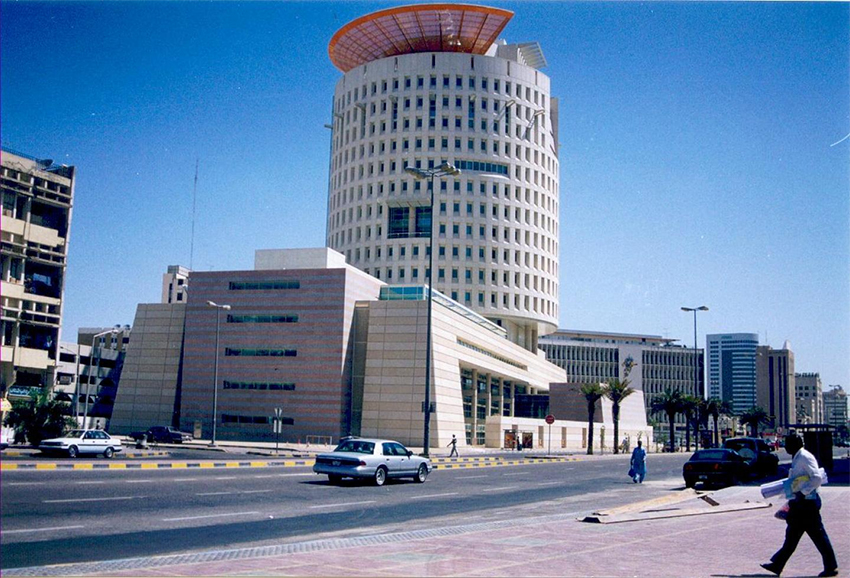08/04/2023
08/04/2023
KUWAIT CITY, April 8: In a clear tone, the head of the Kuwait Chamber of Commerce and Industry, Muhammad Al-Saqer, sent messages diagnosing Kuwait’s situation politically and economically, to the point where he said that “with the exception of the catastrophe of the invasion, I believe that the disappointment that Kuwait is currently experiencing is the most bitter, the deepest, and the most oppressive,” reports Al-Rai daily. Speaking on the occasion of the 59th meeting of the Chamber’s General Assembly last week, he said “the Greek myth says that the gods of Athena were angry with the ambition and un-bridledness of the young Sisyphus, so she ordered him to carry a large rock to the top of Mount Olympus, and whenever Sisyphus approached the top, the rock would fall off him.”

Al-Saqer pointed out that “attempts to rise and fall are repeated, so that history becomes futile and repetitive, instead of being constructive and prosperous, and we find ourselves, after 5 decades or more, interested in the same challenges, concerned with the same questions, exhausted by the same differences and paradoxes, helpless in the face of the same challenges.” He emphasized that “the fall of the rock this time came quickly and shockingly, and in a local atmosphere almost suffocated by those who dare the law, arrogance against the three authorities under the slogan of freedom of opinion, and emptying the seats of administrative leaders without clear reasons under the name of reform.
This time this fall came in the midst of regional and international transformations that are redrawing the borders of states, distributing interests, and forming alliances, so that there is nothing left for those who missed the train except to lament. Al-Saqer went on to say: “I know that what I say is painful and frustrating, and you know -- on the other hand -- that it is an honest and tactless description of the current political scene in our homeland Kuwait, and it is a scene with which I preface my speech, but I will not expand on it, because all of Kuwait has no speech other than it. And because I want to take advantage of my pause to tell you about the economic scene, which has been -- as usual -- forgotten by the absolute dominance of political affairs.

“The economic scene is no less important than the political scene, and it may exceed in pain, oppression and frustration,” he said. Al-Saqer reminded, through three quick pauses, of the close connection between the future and the private sector, and the sandstorms obscuring the vision in which this sector operates, as follows: First: With the beginning of oil production -- and relying on it -- Kuwait chose a development model that relied on state capitalism and the dominance of its public sector. It is fair to say that this choice was justified at that time, but the Kuwaiti economic predicament began to take shape with the state’s continuation of this development model, despite the radical change in all the circumstances and data that justified its adoption in the beginning. Al-Saqer explained that what increased the seriousness of this severe and prolonged deviation from the state’s economic role in democratic countries is that Kuwait has adopted financial policies that are absolutely biased towards the distribution of wealth rather than its development, and to exaggerating the welfare of the present at the expense of sustainability and the future. Al-Saqer stated, “As a result of all this, the state and its public sector are unable to provide remunerative, productive and sustainable job opportunities for newcomers to the labor market, whose number is estimated at more than 100,000 citizens during the next four years. The private sector has also become unable to compete with the state and its public sector in attract these citizens. He stressed that “the future of Kuwait and its generations is based on our success in designing and implementing a development model based on the private sector on the one hand, and on financial policies aimed at developing and sustaining wealth on the other hand,” pointing out that “our evasion of this entitlement has led to an increase in its social, financial and political costs, and to Feeding tension and aggravation in the trilogy (governance, democracy and development) in Kuwait. Second: Despite this central and future importance of the private sector and its developmental role in Kuwait, we note -- with a mixture of regret, anger and astonishment -- that this sector with all its activities, institutions and people is subjected to an unjust campaign that not only undermines its efficiency, role and usefulness, but also calls into question its history, patriotism and credibility.
Al-Saqer pointed out that “this campaign makes allegations that are baseless, fueled by hatred that has no reason except for the failure of its companions, ignorant guidance, and unknown funding,” pointing out that “despite the pain this campaign causes us; it would not have aroused our interest had it not been for what we find for it.” It would resonate with the legislative and executive authorities, had it not been for the incubating environment enjoyed by some of the leaders of the two authorities. Al-Saqer continued, “And if the private sector slanderers forget all of this, how can they forget the role of Kuwait’s merchants in establishing its modern state and raising the bases of its constitutional institutions, with the support, participation and blessing of the late Amir Sheikh Abdullah Al-Salem? How do they forget the role of Kuwaiti merchants in their commitment to charitable work? How do they forget that God Almighty has permitted trade and forbidden usury, and that His Messenger has indicated that nine tenths of livelihood is in trade? How can they forget that the Kuwaitis did not establish their society and state on this sun-bathed land except because of its genius commercial activity? And that the “ship”, a symbol of trade and merchants, is an essential part of the emblem of the State of Kuwait? Third: At the end of 2020, and as a warning to the implications and repercussions of downgrading Kuwait’s credit rating, and under the title “Our homeland is in danger”, the “Chamber” published a memorandum stating in its context ‘We in the Kuwait Chamber of Commerce and Industry know and warn that Kuwait is heading towards a structural crisis.” We call for a pause that absorbs the comprehensive and profound changes locally and globally, technically, politically and economically, and we are certain that these changes impose - necessarily - a change of the same depth and comprehensiveness, which confirms the inevitability of governance and accountability, and reconsider the concepts of justice, welfare and efficiency, and balances the rights of generations.


